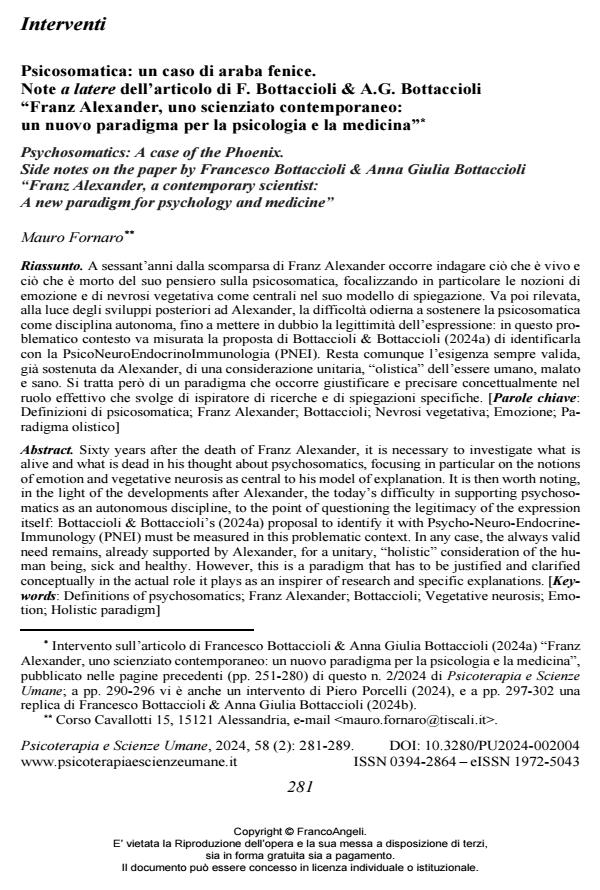Psychosomatics: A case of the Phoenix. Side notes on the paper by Francesco Bottaccioli & Anna Giulia Bottaccioli “Franz Alexander, a contemporary scientist: A new paradigm for psychology and medicine”
Journal title PSICOTERAPIA E SCIENZE UMANE
Author/s Mauro Fornaro
Publishing Year 2024 Issue 2024/2
Language Italian Pages 9 P. 281-289 File size 59 KB
DOI 10.3280/PU2024-002004
DOI is like a bar code for intellectual property: to have more infomation
click here
Below, you can see the article first page
If you want to buy this article in PDF format, you can do it, following the instructions to buy download credits

FrancoAngeli is member of Publishers International Linking Association, Inc (PILA), a not-for-profit association which run the CrossRef service enabling links to and from online scholarly content.
Sixty years after the death of Franz Alexander, it is necessary to investigate what is alive and what is dead in his thought about psychosomatics, focusing in particular on the notions of emo-tion and vegetative neurosis as central to his model of explanation. It is then worth noting, in the light of the developments after Alexander, the today’s difficulty in supporting psychosomatics as an autonomous discipline, to the point of questioning the legitimacy of the expression itself: Bottaccioli & Bottaccioli’s (2024a) proposal to identify it with Psycho-Neuro-Endocrine-Immunology (PNEI) must be measured in this problematic context. In any case, the always valid need remains, already supported by Alexander, for a unitary, “holistic” consideration of the hu-man being, sick and healthy. However, this is a paradigm that has to be justified and clarified conceptually in the actual role it plays as an inspirer of research and specific explanations.
Keywords: Definitions of psychosomatics; Franz Alexander; Bottaccioli; Vegetative neurosis; Emo-tion; Holistic paradigm
- Alexander F. (1946). La esperienza emozionale correttiva. Psicoterapia e scienze umane, 1993, 27, 2: 85-101 (trad. it. dei capitoli 2, 4 e 17 di: Alexander F., French T.M. et al., Psychoanalytic Therapy: Principles and Applications. New York: Ronald Press, 1946); edizione su Internet con una introduzione di Paolo Migone: -- www.psychomedia.it/pm/modther/probpsiter/alexan-1.htm).
- Alexander F. (1950). Psychosomatic Medicine. Its Principles and Applications. New York: Norton (ristampa del 1987, con una Introduzione di George H. Pollock) (trad. it. Medicina psicosomatica. Firenze: Editrice Universitaria, 1951).
- American Psychiatric Association (2000). Diagnostic and Statistical Manual of Mental Disorders, Fourth Edition, Text Revision (DSM-IV-TR). Washington, D.C.: APA (trad. it.: DSM-IV-TR. Manuale diagnostico e statistico dei disturbi mentali, Text Revision. Milano: Masson, 2001).
- Bottaccioli F. & Bottaccioli A.G. (2024a). Franz Alexander, uno scienziato contemporaneo: un nuovo paradigma per la psicologia e la medicina. Psicoterapia e Scienze Umane, 58, 2: 251-280. DOI: 10.3280/PU2024-002002
- Bottaccioli F. & Bottaccioli A.G. (2024b). Risposta agli interventi di Mauro Fornaro e Piero Porcelli. Psicoterapia e Scienze Umane, 58, 2: 297-302. DOI: 10.3280/PU2024-002006
- Bertini M. (1988). Psicologia della salute. Roma: NIS (nuova edizione: Milano: Raffaello Cortina, 2012).
- Bria P., Nesci D.A. & Pasnau R.O. (2009). La psichiatria di consultazione e collegamento. Teoria, clinica, ricerca e formazione. Roma: Alpes.
- Canali S. & Pani L. (2003). Emozioni e malattia. Dall’evoluzione biologica al tramonto del pensiero psicosomatico. Milano: Bruno Mondadori.
- Engel G.L. (1977). The need for a new medical model: A challenge for biomedicine. Science, 196, 4286: 129-136.
- Fava G.A. & Sonino N. (2005), The clinical domains of psychosomatic medicine. Journal of Clinical Psychiatry, 66, 7: 849-58.
- Fornaro M. (2007). Psicosomatica ieri e oggi. Indagine sull’eredità storica di Freud e Alexander. Alla luce dei nodi teorici ricorrenti. Psicoterapia e Scienze Umane, 41, 3: 315-344.
- Fornaro M. (2008). La psicosomatica è morta… viva la psicosomatica. Appunti per una riflessione storico-epistemologica. Psicologi a Confronto. Rivista dell’Ordine degli Psicologi del Piemonte, 2, 1: 47-54.
- Kuhn T. (1962). The Structure of Scientific Revolutions (2nd Edition: 1970). Chicago, IL: University of Chicago Press (trad. it.: La struttura delle rivoluzioni scientifiche. Torino: Einaudi, 1969).
- Marty P., de M’Uzan M. & David C. (1963). L’investigation psychosomatique. Paris: PUF (trad. it.: L’indagine psicosomatica. Torino: Boringhieri 1971).
- McIntyre J.S. (2002). A new subspecialty. American Journal of Psychiatry, 159, 12: 1961-1963.
- Mecacci L. (1998). Storia della psicologia del Novecento. Bari: Laterza.
- Nardini M. (2006). Postfazione. In: Todarello O. & Porcelli P., a cura di, Trattamenti in medicina psicosomatica. Milano: FrancoAngeli, 2006, pp. 381-383.
- Nemiah J.C. & Sifneos P.E. (1970). Affects and fantasy in patients with psychosomatic disorders. In: Hill O.W., editor, Modern Trends in Psychosomatic Medicine. London: Butterworth, 1970, pp. 26-34.
- Porcelli P. (2009). Medicina psicosomatica e psicologia clinica. Modelli teorici, diagnosi e trattamento. Milano: Raffaello Cortina (Nuova edizione: 2022).
- Porcelli P. (2012). Sviluppi contemporanei della psicosomatica. Psicoterapia e Scienze Umane, 46, 3: 359-388. DOI: 10.3280/PU2012-003002
- Selye H. (1956). The Stress of Life. New York: McGraw-Hill. Revised edition: 1976 (trad. it.: Stress. Torino: Einaudi, 1957).
- Solano L. (2013). Tra mente e corpo. Come si costruisce la salute. Milano: Raffaello Cortina.
- Le Opere Complete di Paul Parin in 19 volumi Marco Conci, in PSICOTERAPIA E SCIENZE UMANE 2/2024 pp.303
DOI: 10.3280/PU2024-002007 - Risposta agli interventi di Mauro Fornaro e Piero Porcelli Francesco Bottaccioli, Anna Giulia Bottaccioli, in PSICOTERAPIA E SCIENZE UMANE 2/2024 pp.297
DOI: 10.3280/PU2024-002006
Mauro Fornaro, Psicosomatica: un caso di araba fenice. Note a latere dell’articolo di F. Bottaccioli & A.G. Bottaccioli “Franz Alexander, uno scienziato contemporaneo: un nuovo paradigma per la psicologia e la medicina” in "PSICOTERAPIA E SCIENZE UMANE" 2/2024, pp 281-289, DOI: 10.3280/PU2024-002004